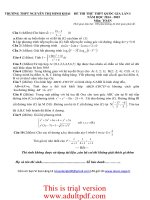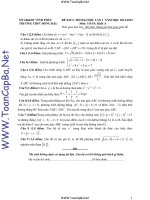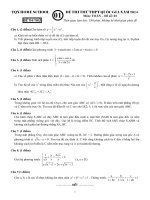Tải Đề thi thử THPT Quốc Gia môn tiếng Anh năm 2020 số 28 - Đề thi tốt nghiệp THPT 2020 môn Anh có đáp án
Bạn đang xem bản rút gọn của tài liệu. Xem và tải ngay bản đầy đủ của tài liệu tại đây (142.54 KB, 9 trang )
<span class='text_page_counter'>(1)</span><div class='page_container' data-page=1>
<b>ĐỀ THI THỬ THPTQG MÔN TIẾNG ANH</b>
<b>NĂM 2020 CÓ ĐÁP ÁN</b>
<i><b>Mark the letter A, B, C, or D to indicate the word whose underlined part differs from the</b></i>
<i><b>other three in pronunciation in each of the following questions.</b></i>
<b>Question 1: A. loves</b> <b>B. learns</b> <b>C. stops </b> <b>D. calls </b>
<b>Question 2: A. culture</b> <b>B. student</b> <b>C. institution </b> <b>D. university </b>
<i><b>Mark the letter A, B, C, or D to indicate the word that differs from the other three in the</b></i>
<i><b>position of the primary stress in each of the following questions.</b></i>
<b>Question 3: A. blackboard B. listen</b> <b>C. between</b> <b>D. student</b>
<b>Question 4: A. dedicate</b> <b>B. effective</b> <b>C. politics </b> <b>D. energy </b>
<i><b>Mark the letter A, B, C or D to indicate the correct answer to each of the following questions.</b></i>
<b>Question 5: It is impossible for him to be financially independent at such an early age,</b>
________?
<b>A. isn't it</b> <b>B. is it</b> <b>C. doesn't he </b> <b>D. does he </b>
<b>Question 6: I’m sure you’ll have no difficulty_________ the exam.</b>
<b>A. pass</b> <b>B. to pass</b> <b>C. passed</b> <b>D. passing</b>
<b>Question 7: If computers become as smart as humans, ________ our jobs better than we can?</b>
<b>A. would they do </b> <b>B. will they do </b> <b>C. do they do</b> <b>D. they will do </b>
<b>Question 8: Many students _______ home for their holidays for the past few weeks.</b>
<b>A. has gone</b> <b>B. had gone</b> <b>C. goes </b> <b>D. have gone </b>
<b>Question 9: The second-hand car Patrick bought was almost new ________ it was made in the</b>
1995s.
<b>A. or</b> <b>B. because</b> <b>C. although </b> <b>D. however </b>
<b>Question 10: By the time Ryan finally graduated from high school, he ________five different</b>
schools because his parents moved frequently.
<b>A. attended</b> <b>B. was attending</b> <b>C. had attended </b> <b>D. has been attending </b>
<b>Question 11: Unfortunately, his company closed down because it couldn’t keep pace________</b>
modem technology.
<b>A. of</b> <b>B. on </b> <b>C. up</b> <b>D. with</b>
</div>
<span class='text_page_counter'>(2)</span><div class='page_container' data-page=2>
environment.
<b>A. organizing</b> <b>B. organized </b> <b>C. to organize</b> <b>D. which organize </b>
<b>Question 13: We're best friends as we have a ______ interest in music.</b>
<b>A. passion</b> <b>B. passionately</b> <b>C. passionless </b> <b>D. passionate </b>
<b>Question 14: The lottery winner was willing to spend a considerable sum of money to give</b>
______ to charity to help those in need.
<b>A. away</b> <b>B. in</b> <b>C. back </b> <b>D. up </b>
<b>Question 15: The local clubs are making every _______</b> to interest more young
people.
<b>A. volunteer</b> <b>B. effort</b> <b>C. donation </b> <b>D. fund </b>
<b>Question 16: We are raising funds for people with visual ________ in the city.</b>
<b>A. breakages</b> <b>B. failures</b> <b>C. impairments </b> <b>D. damages </b>
<b>Question 17: I had a ______ chat with my manager and gave him an update on the project.</b>
<b>A. brief</b> <b>B. short</b> <b>C. quick </b> <b>D. lull </b>
<b>Question 18: It’s normal for small businesses to operate at a ______ for the first couple of</b>
years before they start to break even.
<b>A. loss</b> <b>B. failure</b> <b>C. luck </b> <b>D. loose </b>
<i><b>Mark the letter A, B, C or D to indicate the word(s) CLOSEST in meaning to the underlined</b></i>
<i><b>word(s) </b></i>
<b>Question 19: If the rain doesn't let up soon, we shall have to look for a taxi.</b>
<b>A. brighten</b> <b>B. stop</b> <b>C. clear </b> <b>D. darken </b>
<b>Question 20: I am now reconciled with two of my estranged siblings - not just my older</b>
brother, but my sister, whom I hadn't spoken to for 17 years.
<b>A. contactable</b> <b>B. harmonized</b> <b>C. opposed </b> <b>D. truthful </b>
<i><b>Mark the letter A, B, C or D to indicate the word(s) OPPOSITE in meaning to the underlined</b></i>
<i><b>word(s) </b></i>
<b>Question 21: The rapid development of artificial intelligence can replace many people in their</b>
<b>jobs and make many people unemployed.</b>
<b>A. have a job working for a company or another person</b>
<b>B. not have a job that provides money</b>
</div>
<span class='text_page_counter'>(3)</span><div class='page_container' data-page=3>
<b>Question 22: The library reduced the number of print newspapers and magazines that they</b>
used to
subscribe to.
<b>A. increased </b> <b>B. decreased </b> <b>C. rose</b> <b>D. fluctuate </b>
<i><b>Mark the letter A, B, C, or D on your answer sheet to indicate the sentence that best</b></i>
<i><b>completes each of the following exchanges</b></i>
<b>Question 23: - Mai: "How fashionable a pair of trainers you have!”</b>
- Nam: "_________________."
<b>A. Do you want to know where I bought them?</b> <b>B. </b> Thanks for your
compliment.
<b>C. I know it's fashionable. </b> <b>D. Yes, of course. </b>
<b>Question 24: Hanh: “It's very generous of you to offer to pay!”</b>
Quan: “_________________.”
<b>A. I'm glad you like it.</b> <b>B. Thanks a million.</b>
<b>C. That was the least I could do. </b> <b>D. You can say that again. </b>
<i><b>Read the following passage and mark the letter A, B, C, or D on your answer sheet to</b></i>
<i><b>indicate the correct word or phrase that best fits each of the numbered blanks from 25 to</b></i>
<i><b>29.</b></i>
If you want to prepare yourself for great achievement and have more to (25)_____to
your education or your work, try reading more books. Pick (26)_____some of the interestingly
informative books and search for well-researched materials that can help you grow.
</div>
<span class='text_page_counter'>(4)</span><div class='page_container' data-page=4>
you massive amounts of time and you will be able to assimilate vast quantities of information.
<b>Question 25: A. gain</b> <b>B. gather</b> <b>C. collect</b> <b>D. contribute</b>
<b>Question 26: A. on</b> <b>B. up</b> <b>C. over</b> <b>D. out</b>
<b>Question 27: A. that</b> <b>B. who</b> <b>C. when</b> <b>D. whom</b>
<b>Question 28: A. digest</b> <b>B. inhale</b> <b>C. breathe</b> <b>D. eat</b>
<b>Question 29: A. Lots</b> <b>B. a lot of</b> <b>C. a number of</b> <b>D. little</b>
<i><b>Read the following passage and mark the letter A, B, C, or D on your answer sheet to</b></i>
<i><b>indicate the correct answer to each of the questions from 30 to 34.</b></i>
The Hindu culture celebrates marriage as a pure and pristine rite enabling two individuals start
their journey of life together. It puts emphasis on the values of happiness, harmony and growth
and could be traced back from the Vedic times.
Months before the wedding ceremony, an engagement is held which is called “magni”. The
couple is blessed here with gifts, jewelry and clothes. Another important ritual is the “mehendi”
<b>which is a paste made from the leaves of henna plant. It is the traditional art of adorning the</b>
hands and the feet of the bride with mehendi and the name of the groom is also hidden in the
design.
On the day of marriage, the couple exchanges garlands as a gesture of acceptance of one
another and a pledge to respect one another as partners which is known as “jaimala”. This is
followed by “kanyadaan”, where the father of the bride places her hand in the groom’s hand
requesting him to accept her as an equal partner.
Another ritual is the “havan” in which the couple invokes Agni, the god of Fire, to witness their
commitment to each other. Crushed sandalwood, herbs, sugar rice and oil are offered to the
ceremonial fire. The “gath bandhan” takes place where scarves of the bride and groom are tied
together symbolizing their eternal bond. This signifies their pledge before God to love each
other and remain loyal. The couple then takes four “mangal pheras” or walk around the
ceremonial fire, representing four goals in life: “Dharma”, religious and moral duties; “Artha”,
prosperity; “Kama” earthly pleasures; “Moksha”, spiritual salvation.
The couple also takes seven steps together to begin their journey, called the “saptapardi”. Then
the ritual of “sindoor” takes place where the groom applies a small dot of vermilion, a red
powder to the bride’s forehead and welcomes her as his partner for life. This signifies the
completion of the marriage. The parents of the bride and the groom then give their blessings,
“ashirwad” to the newly wed couple as they touch the feet of their parents.
</div>
<span class='text_page_counter'>(5)</span><div class='page_container' data-page=5>
<b>A. The Hindu culture</b> <b>B. The Hindu religion</b>
<b>C. The Hindu wedding</b> <b>D. The Hindu tradition</b>
<b>Question 31. What do the Hindu people think about marriage?</b>
<b>A. It is entirely a spiritual traditional ritual allowing two individuals to live together.</b>
<b>B. It is a belief in the growth of a family newly formed by two individuals.</b>
<b>C. It is a wish of happiness and harmony to come to two individuals.</b>
<b>D. It is just a living-together announcement of two individuals.</b>
<b>Question 32. What can the word “adorning” be best replaced by?</b>
<b>A. decorating</b> <b>B. painting</b> <b>C. repairing</b> <b>D. dying</b>
<b>Question 33. Why does the couple exchange garlands?</b>
<b>A. to do a ritual</b>
<b>B. to show both their acceptance of and the swear to respect the partner</b>
<b>C. to express their acceptance of one another and a wish of happiness</b>
<b>D. to express their vow to respect each other for the whole life</b>
<b>Question 34. When is the wedding ceremony completed?</b>
<b>A. When the parents of the bride and the groom give their blessings to the couple.</b>
<b>B. When the couple touches their parents’ feet.</b>
<b>C. When the couple makes seven steps together.</b>
<b>D. When the groom applies a small dot of vermillion of the bride’s forehead.</b>
<b>Read the following passage and mark the letter A, B, C, or D to indicate the</b>
<b>answer to each of the question.</b>
Most parents want their sons and daughters to have equal chances of success
when they grow up. Today, equality of the sexes is largely mandated by public policy and
law. However, old- fashioned ideas and a lot of prejudice are still part of our culture
and present challenging questions for parents.
</div>
<span class='text_page_counter'>(6)</span><div class='page_container' data-page=6>
comments, when girls speech, teachers tend to focus on the behavior. It's more
important how the girls act rather than what they say.
The emphasis on differences begins at birth and continues throughout
childhood. For example, few people would give pink baby's clothes to a boy or a blue
blanket to a girl. Later, many of us give girls dolls and miniature kitchenware, while
<b>boys receive action figures and construction sets. There's nothing wrong with that. The</b>
<b>problem arises when certain activities are deemed appropriate for one sex but not the</b>
other. According to Heather J. Nicholson, Ph.D., director of the National Resource
Center for Girls, Inc., this kind of practice prevents boys and girls from acquiring
important skills for their future lives.
"The fact is," says Nicholson, "that society functions as a kind of sorting machine
regarding gender. In a recent survey, fifty-eight percent of eighth-grade girls but only
six percent of boys earned money caring for younger children. On the other hand,
twenty-seven percent of boys but only three percent of girls earned money doing lawn
<b>work". If we are serious about educating a generation to be good workers and parents,</b>
we need to eliminate such stereotypes as those mentioned previously.
Gender stereotypes inevitably are passed to our children. However, by
becoming aware of the messages our children receive, we can help them develop ways
<b>to overcome these incorrect ideas. To counteract these ideas, parents can look for</b>
ways to challenge and support their children, and to encourage confidence in ways
that go beyond what society's fixed ideas about differences of sext are.
<i>(Source: </i><b> </b><i>)</i>
<b>Question 35: Which of the following could be the main idea of the passage?</b>
<b>A. Deep-seated stereotypes about genders and their effects.</b>
<b>B. Different prejudice about how girls and boys should behave and be treated.</b>
<b>C. The role of culture in the behavior of different genders.</b>
<b>D. The influence of education and society on gender stereotypes.</b>
<b>Question 36: According to the second passage, David and Myra Sadker of the American</b>
University of Washington, D.0 found that_____.
<b>A. schoolboys and schoolgirls are treated equally in the classroom.</b>
<b>B. teachers often concentrate on boys' behavior and girls' manners.</b>
</div>
<span class='text_page_counter'>(7)</span><div class='page_container' data-page=7>
<b>D. girls are taught to be insecure, accommodating and illogical while boys are strong,</b>
unemotional, aggressive, and competitive.
<b>Question 37: What does the word "that" in paragraph 3 refer to?</b>
<b>A. The differences between boys and girls begin at birth and continue throughout</b>
childhood.
<b>B. People often give pink clothes to a boy and a blue blanket to a girl.</b>
<b>C. Many people give girls dolls and miniature kitchen and boys receive action figures and</b>
construction sets when they were born.
<b>D. People give different genders of children distinct kinds of presents or clothes.</b>
<b>Question 38: The word "deemed" in paragraph 3 is closest in meaning to </b> ___ .
<b>A. celebrated</b> <b>B. supposed</b> <b>C. designed</b> <b>D. established</b>
<b>Question 39: According to the passage, which of the following is UNTRUE about gender</b>
stereotypes?
<b>A. Male and female children are expected to behave the same as what adults think they</b>
should.
<b>B. The distinctions in treatment to boys and girls commence when they were given birth.</b>
<b>C. Its beneficial for children to practice fundamental skills if they are treated unequally</b>
quite early.
<b>D. Children are differently treated not only at homes but also at schools.</b>
<b>Question 40: The result of a recent survey showed that the number of girls at the age of</b>
eight paid for babysitting was .
<b>A. 58%</b> <b>B. 27%</b> <b>C. 6%</b> <b>D. 3%</b>
<b>Question 41: The word "counteract" in the last paragraph could be best replaced by</b>
__ .
<b>A. promote</b> <b>B. frustrate</b> <b>C. encourage</b> <b>D. inspire</b>
<b>Question 42: What can be inferred from the passage?</b>
<b>A. Parents are able to help reduce the influence of gender stereotypes on their children.</b>
<b>B. Teachers and parents have to join hands to encourage children's confidence in social</b>
activities.
<b>C. Society functions often categorize jobs regardless genders.</b>
<b>D. The problems males and females get when they are adults may originate from gender</b>
</div>
<span class='text_page_counter'>(8)</span><div class='page_container' data-page=8>
<i><b>Mark the letter A, B, C, or D on your answer sheet to indicate the underlined part that needs</b></i>
<i><b>correction </b></i>
<b>Question 43: Physics and mental exercise has been found to be beneficial to our brains, but</b>
<b>scientists have now found it could also improve the learning ability of our children.</b>
<b>A. Physics</b> <b>B. has been</b> <b>C. it</b> <b>D. learning ability</b>
<b>Question 44: Many nations protect endangered species by forbidding hunting, to restrict land</b>
development and creating preserves.
<b>A. protect</b> <b>B. by forbidding</b> <b>C. to restrict </b> <b>D. and creating</b>
<b>Question 45: Anyone who gambles on the stock exchange has to be prepared to loose money.</b>
<b>A. Anyone who</b> <b>B. on</b> <b>C. has to be </b> <b>D. to loose money </b>
<i><b>Mark the letter A, B, C, or D on your answer sheet to indicate the sentence that is closest in</b></i>
<i><b>meaning to each of the following questions </b></i>
<b>Question 46: The professor is a more efficient financial adviser than the expert.</b>
<b>A. The professor gives advice on finance less efficiently than the expert.</b>
<b>B. The expert is a less efficient financial adviser than the professor.</b>
<b>C. The professor gives advice on finance not as efficiently as the expert. </b>
<b>D. The expert gives financial advice more efficiently than the professor. </b>
<b>Question 47: "Let's tell Dad about our problem” said Carol to Tony. </b>
<b>A. Carol ordered Tony to tell Dad about their problem. B. Carol suggested telling Dad about</b>
their problem.
<b>C. Carol forbid Tony to tell Dad about their problem. D. Carol allowed Tony to tell Dad</b>
about their problem.
<b>Question 48: It is against the school rules to cheat in the test.</b>
<b>A. You don't have to cheat in the test.</b> <b>B. You must cheat in the test.</b>
<b>C. You must not cheat in the test. </b> <b>D. You have to cheat in the test. </b>
<i><b>Mark the letter A, B, C, or D on your answer sheet to indicate the sentence that best</b></i>
<i><b>combines each pair of sentences in the following questions</b></i>
<b>Question 49: She wasn’t wearing a seat-belt. She was injured.</b>
<b>A. If she hadn’t been wearing a seat-belt, she wouldn’t have been injured.</b>
<b>B. If she had been wearing a seat-belt, she would have been injured.</b>
<b>C. If she had been wearing a seat-belt, she wouldn’t be injured.</b>
</div>
<span class='text_page_counter'>(9)</span><div class='page_container' data-page=9>
<b>Question 50: Harry had packed his luggage. After that, he loaded it into the car and set off for</b>
the airport.
<b>A. Packing his luggage, Harry loaded it into the car and set off for the airport.</b>
<b>B. Only after Harry had packed his luggage, did he load it into the car and set off for the</b>
airport.
<b>C. No sooner had Harry packed his luggage when he loaded it into the car and set off for the</b>
airport.
<b>D. Not until had Harry packed his luggage did he load it into the car and set off for the airport</b>
<b>ĐÁP ÁN</b>
<b>1</b> <b>2</b> <b>3</b> <b>4</b> <b>5</b> <b>6</b> <b>7</b> <b>8</b> <b>9</b> <b>10</b>
<b>C</b> <b> A</b> <b>C</b> <b>B</b> <b>B</b> <b>D</b> <b>B</b> <b>D</b> <b>C</b> <b>C</b>
<b>11</b> <b>12</b> <b>13</b> <b>14</b> <b>15</b> <b>16</b> <b>17</b> <b>18</b> <b>19</b> <b>20</b>
<b>D</b> <b>B</b> <b>D</b> <b>A</b> <b>B</b> <b>C</b> <b>A</b> <b>A</b> <b>B</b> <b>B</b>
<b>21</b> <b>22</b> <b>23</b> <b>24</b> <b>25</b> <b>26</b> <b>27</b> <b>28</b> <b>29</b> <b>30</b>
<b>A</b> <b>A</b> <b>B</b> <b>C</b> <b>D</b> <b>B</b> <b>A</b> <b>A</b> <b>B</b> <b>C</b>
<b>31</b> <b>32</b> <b>33</b> <b>34</b> <b>35</b> <b>36</b> <b>37</b> <b>38</b> <b>39</b> <b>40</b>
<b>A</b> <b>A</b> <b>B</b> <b>D</b> <b>A</b> <b>C</b> <b>D</b> <b>B</b> <b>C</b> <b>A</b>
<b>41</b> <b>42</b> <b>43</b> <b>44</b> <b>45</b> <b>46</b> <b>47</b> <b>48</b> <b>49</b> <b>50</b>
<b>B</b> <b>A</b> <b>B</b> <b>C</b> <b>D</b> <b>B</b> <b>B</b> <b>C</b> <b>D</b> <b>B</b>
</div>
<!--links-->
Đề thi thử Đại học môn Hóa lần 3 năm 2014 trường THPT Gia Lộc, Hải Dương Đề thi thử THPT Quốc gia môn Hóa có đáp án
- 16
- 890
- 0








